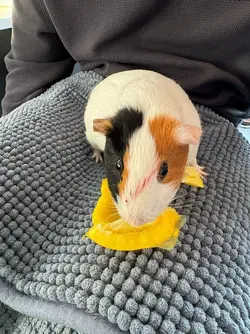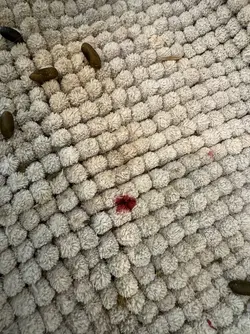Glucosamine has to be administered in the correct amount. You can order Cosequin for cat, which is powder. But glucosamine for bladder problems hasn't been researched. It's mostly been researched for arthiritis in guinea pig, and if I remember correctly, bone infection to reduce inflammation.
What has been researched for bladder problems in guinea pigs is CARTROPHEN. If you go to Facebook and search for "The CAVY SAVVY GUINEA PIG COMMUNITY", go that page, and then search for "CARTROPHEN", you will find one or posts where cartrophen is discussed. It works well.
NOTE: Be sure to go the correct CAVY SAVVY facebook page. It is moderated by exotic animal vets, who are guinea pig experts. Do not make the mistake of going to "CAVY SAVVY GUINEA PIG HELP" page, which is a rescue run, whose owner thinks she is an expert, but I have found some of her advice to be incorrect or perhaps even harmful!
Another treatment that I have used is making barley water. Put 2.5 cups water in a pan and 1/2 cup barley. Use the old-fashioned barley pearl, not the instant breakfast flakes. Heat the barley to boiled, stirring ocassionally so it doesn't stick to the bottom of the pan, then reduce heat and simmer until the barley is soft. There should be water in the pan too. If all the water is gone, then you overcooked the barley, but that's okay. Just add some water (about 1/2) and stir. The water will be cloudy. Pour the water into a small bowl and let it cool. DO NOT USE A STRAINER. When the water is room temperature, get a 1 ml syringe ( no needle) and give your piggie at least 2 ml orally. If she wants more, give her as much as she wants (the more the merrier)
Give her barley water twice a day. What it does is coat the bladder, urethra, and it also helps the kidneys. This is an excellent treatment to help a piggie with any kind of urinary problems (except obstruction) and it's very safe. My guinea pig finally started drinking barley water from one of his small ceramic bowls. So, I would give her a little bit twice a day (I think I measured 10 ml - just enough to cover the bottom of the bowl) and later once a day. After the first week, I gave it to her 3 times a week and the following week, she got better.
You can store barley water in the fridge if you put plastic wrap over the bowl you poured it into from the pan. It will turn into a gel. No problem. Take a spoonful, add a tiny bit of water, and heat in your microwave for a few seconds. Stir, and now you have barley water again.
What about the barley itself that's leftover in the pan? Give some to your guinea pigs as a treat. And be sure to help yourself also.
Peter Gurney discovered the value of barley for treating urinary system problems. You can also give pure apricot nectar. Do NOT give cranberry juice. Why not? Well, you can once or twice a week. But cranberries are high in oxylate (like basil), so it should only be given sparingly. Whereas apricot juice, you can give it once a day. Both juices work the same: they coat the urethra (and to some extent the bladder), which reduces pain and it also helps get rid of bacteria AND prevents bacteria from getting in from the outside. I had better luck with barley water than juice concerning sludge in the urine or "dirty urine", which has "sand" that is actually tiny solid particles, probably calcium, which is the most common thing a "bladder stone" is made of.
So, another thing you have to do is get rid of excess calcium in the diet. This means no alfala-based dry food (choose Oxbow Cavy Cuisine or Versele Laga Complete Cavia instead), no endive, kale, collards greens, brocolli, etc. You can find a list if you Google "veggies high in calcium". Also, give your piggie lots of cucumber and watermelon. Cucumber is the king of vegetables concerning good nutrients and hydration. Watermelon is also beneficial and a good hydrator. Guinea pigs can eat watermelon seeds (one of the few kinds of seed that they can safely eat). Wash the rind and cut into little pieces. Some like the rind, some like the fruit, and some like both

In closing, I hope your guiena pig feels better soon. Be sure to read about Cartrophen because it can be given long term with good resuilts!


